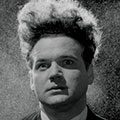“In the summer of 1983, just days before the birth of his first son, writer and theologian John Hull went blind. In order to make sense of the upheaval in his life, he began keeping a diary…”
I really can’t believe how great this studio has been for exposing me to new and interesting documentaries. Notes on Blindness is another one that I wasn’t familiar with, but ended up really loving (and taking a lot from). The film was constructed from hours and hours of journalistic/confessional monologues Hull recorded onto cassette tape over the span of years, with archival footage and recreations using actors among the techniques used to visualise the material.
Notes on Blindness relies so heavily on its source material that at first glance the film may seem secondary to it, like it’s just the visual accompaniment to a story told primary through sound. But while it’s somewhat true that the film’s primary vector is sound, and it would absolutely work as a podcast or extended audio documentary, I think the fact that it is a film is quite important to the experience. There’s a scene where Hull describes his appreciation for rain, the sound of which gives him a sense of his surroundings when he’s out in the world, and how he wishes that he could make it rain inside so he could achieve the same experience indoors. What follows is a really beautiful and poetic sequence of shots of the inside of a house — tables, chairs, a piano — being drenched with rain, giving the viewer not only a satisfying visualisation of Hull’s inner desires, but also a indelible cinematic image. The film is full of moments like these, where the material is elevated by its presentation in a film as opposed to being experienced solely through sound.
The film got me thinking about the idea of a director who finds a cache of pre-existing material and decides to make a film about it, as directors Peter Middleton and James Spinney did with Notes on Blindness. I can’t think of too many films that fit this bill, but they range from the important and historic (German Concentration Camps Factual Survey, 2015), to the philosophical (Grizzly Man, 2005), to the weird and quirky (Shut Up Little Man!, 2011).
One film that strikes me as similar to Notes on Blindness is Finding Vivian Maier, which describes filmmaker John Maloof’s chance discovery of hundreds of photographs taken by an unknown but talented New York street photographer named Vivian Maier.
I hated Finding Vivian Maier, and now having seen Notes on Blindness and thought about the implications of making a film based on archival material, I think I finally understand why: Maier was deceased by the time Maloof discovered her photographs in an estate auction, and consequently she has zero agency in the telling of her own story. We discover through the course of the film that Maier was essentially a recluse, and never shared her photographs with the public or even members of her own family. But Maloof not only shows her photographs publicly, he interviews dozens of people who knew Maier about her life and why she kept her work so secret, which I think flies in the face of how she would have wanted her story told (if at all). Obviously Maier lost control of her life and work once she died, and Maloof was completely within his legal rights to make his film, but it never sat right with me that the director knew how reclusive his subject was and decided to make a major documentary film about her anyway.
Notes on Blindness, on the other hand, incorporates the participation of Hull himself and never feels exploitative. Hull made his audio tapes in order for them to be heard, in some way or another, by other people, and the film feels like an extension of Hull’s personal investigation into the experience of blindness and its effect on how he sees the world. Vivian Maier specifically chose not to show anyone her photographs, but then John Maloof came along and decided to do it for her.
I think I’d rather be a Peter Middleton or James Spinney than a John Maloof.
